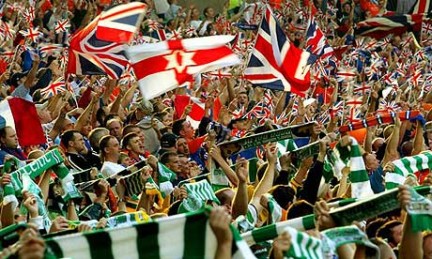Interviews
Published: February 20 2010“We’ve got a connection with this place called Ireland. But that country doesn’t exist anymore…”

DES DILLON
Scottish playwright
For those unfamiliar with the vocabulary of Scottish sectarian invective, you might first explain the title of the play: ‘I’m No a Billy, He’s a Tim.’
In Glasgow, a “Billy” refers to a fan of Rangers football team – 99 times out of 100, he will also be Protestant. And a Tim is a Celtic supporter who, 99 times out of 100, will be Catholic.
The ‘Billy’ presumably is named for William of Orange. What’s the derivation of ‘Tim’?
The Tim Malloys were an Irish Catholic street gang operating in Glasgow in the early 1900s. So a “Tim” is the generic nickname for a Catholic in Scotland. The two characters in the play, then, are a ‘Billy’ and a ‘Tim’.
Yeah. The idea came to me a few years back, when a group of football supporters from both sides were arrested before an Old Firm derby. They were brought up in front of a judge, made pay a fine and released. I got to thinking about what might have happened had one supporter from each side not been able to pay the fine; if these two guys were sharing a prison cell on the afternoon of the match.
They support different teams, but they’re both football fans. And neither man, more than likely, even practises his religion. So is there any real cultural difference between them?
There is. I come from a town called Coatbridge just outside Glasgow. There are seven Catholic churches and they’re full every Sunday. And, despite the fact that most Irish families have been in Scotland four or five generations, we still speak Hiberno-English. We say “auld” instead of “old” and “cauld” instead of “cold”. You’d never hear us say “doon” for “down”. My Granny had a shillelagh, a picture of the Pope and a photo of JFK on her wall. The first time I heard Christy Moore sing, I thought he was singing about us.
That’s not a version of Irishness that many Irish people today would necessarily recognise.
I know. Have you seen the film The Departed ? That’s what Coatbridge is like. We know we’ve got a connection with this country called Ireland. It informs the way we speak and interact with one another. But that Ireland doesn’t exist anymore. It’s almost like we’ve stepped out of a time capsule. Ireland has moved on and we’re left with this almost leprechaun culture. The first time I visited Ireland, I thought I was going to have some sort of spiritual awakening. But it didn’t happen. It was just lashing rain and freezing cold. So I’m Irish – but Coatbridge is my Ireland, if you know what I mean.
From its inception, Celtic always had an Irish Catholic ethos. But, according to one of the characters in your play, Rangers wasn’t always a Protestant team.
That’s true. It wasn’t until workers from Harland and Wolff arrived to build a ship in Govan that the Orange connection developed.
So in a sense, the sectarianism that blights so much of western Scotland was imported, lock stock, from Ireland?
That’s right. If the Larne to Stranraer ferry isn’t sailing, Celtic and Rangers would both lose about 15 to 20 per cent of their attendance. The two biggest teams in Scotland are basically Irish teams. There’s nothing Scottish about them. So that’s kind of what the play is about – what it means to be Scottish. I play the fiddle and I sometimes play Scottish tunes. But you know that whole heart and soul thing? I can only feel that way about Irish tunes. And I wish that wasn’t the case. I would love if both sides could just be Scottish.
There’s a lot of sectarian humour in the play. Is there a risk that a bigot of either stripe could come along, laugh at jokes about the other side, take a couple of jokes about his own side on the chin and leave without reappraising any of his own prejudices?
I don’t think you could go along and not take a hard look at yourself. It played in Belfast and Derry to mixed audiences and got standing ovations. People assume that means Protestants laughing at jokes about Catholics and vice versa, but it’s both sides laughing at themselves.
Do you hold out much prospect for change?
Absolutely. Critics have said “Oh, Des really has his finger on the pulse of the nation . . .” But the thing is, I wrote this play in 1996 and no one would touch it back then. Now the floor is finally open for debate and the show is selling out wherever it goes. Hopefully, that’s a sign that change is finally beginning to happen.
Well, let’s hope so.
We don’t want it to happen too soon though… I need people to come and see my play first!
I’m No a Billy, He’s a Tim will be at the Olympia Theatre, Dublin, on March 19th and 20th
